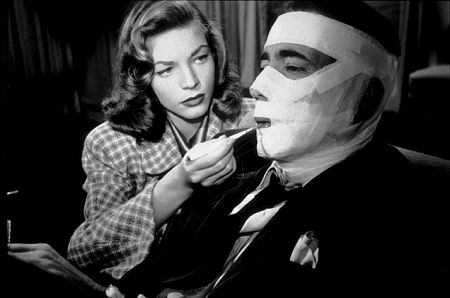Delmer Daves’s 1947 noir Dark Passage is like a complex lucid dream. It’s both stylish and stylized, with the first half-hour or so mostly told via POV shots. We’re following escaped prisoner Vincent Parry (Humphrey Bogart), but he does not–we gradually realize–look like Humphrey Bogart quite yet. The movie deals with this fact by giving us a Parry’s-eye view of the world, with occasional departures for, say, shots where Parry is shrouded in shadows. It’s a practical way to handle the fact that we need Bogart’s voice but can’t yet use Bogart’s face, but in Daves’s hands, it’s more than just clever problem-solving.
This first-act flourish grounds us in Parry’s perspective right when Parry’s life is at its most stressful and its most nightmarishly surreal. Never mind the backstory about him being wrongfully convicted of murdering his wife, we’re talking something a lot more immediate. He’s fumbling around in the scrubby grasses outside San Quentin, desperate to hide; he’s sweating into the passenger seat of somebody’s car, trying to come up with the right lie or brush-off; he’s hiding under some canvas tarps as a policeman’s hand reaches beneath them. And we’re right there with him, with suspicious eyes on us and with the noose tightening. Best of all–in what may be the finest, most darkly compelling scene of the whole film–we’re in a dentist’s chair as a disgraced plastic surgeon, Houseley Stevenson’s affably macabre Dr. Coley looms over us, all twinkling amusement. He’s about to put us under and cut into our face, changing us forever, but first, he wants to muse about how easy it would be for a plastic surgeon to really, really fuck you up: “Ever see any botched plastic jobs? If a man like me didn’t like a fellow… he could surely fix him up for life. Make him look like a bulldog, or a monkey.” Time for the anesthesia! As Coley closes in, and Parry fades into hallucinatory horrors, we feel as helpless as he does.
Luckily, Coley makes Parry look like Humphrey Bogart. (He even immediately establishes that Parry can start smoking before he even takes the bandages off. Ah, 1947.) Parry soon reunites with Lauren Bacall’s Irene, the intense and enigmatic young woman who rescued him and doled out plenty of cash. At this point, the movie starts to catch its breath–Parry still has plenty of hell to go through, with bodies dropping around him and cops nosing about, but the pressure no longer feels as unrelenting. And we’ve got Bogart and Bacall together in all their glory, with their chemistry scorching the celluloid. Dark Passage continues to be entertaining from this point on, with interesting supporting performances and good twists–its ending, in particular, is a delight–but it’s the first forty minutes that make it unforgettable.
Dark Passage is streaming on HBO Max.


